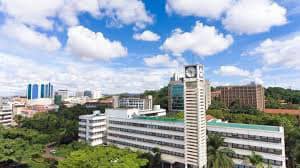#OutToLunch: A mere change of guards won’t transform Kampala city
By Denis Jjuuko
If you have been to Kampala, you may have seen cows strolling on the streets. Sometimes, you may have seen them chilling on the pedestrian overpass on the Kampala Northern Bypass. Cows, apparently, know how to scale the stairs.
Makeshift markets are set up on the streets every day, selling all sorts of things including foodstuffs leaving garbage everywhere. Boda Bodas, the notorious motorcycle taxis in Kampala, move at high speeds from all sorts of directions.
Kampala is one of the cities you look left, right, left, right and left again several times before crossing a one-way street! You simply don’t know where a boda boda will come from. And they will hull insults at you should you look at them sternly.
If you are unlucky, like my friend, you will knock one or two around Mulago as you drive to your office. If it is not cows suddenly trying to cross the road, it is a stray dog sniffing a rotting piece of meat a mile away.
At signalized traffic junctions, when lights turn red, they instead rev up their motorbikes. The traffic police look on haplessly. Passengers have no helmets. Riders hung the helmet somewhere at the front of the bike. The national referral hospital ends up with many broken limbs and crushed skulls. Government prefers to treat them than preventing the accidents! Living in a third world can be strange.
Uganda’s economy is mainly based in Kampala and makes losses of approximately US$800m or Shs3 trillion a year in gross domestic product according to the World Bank. KCCA itself carries this unwanted statistic on its website. The reason is traffic congestion. Kiira Motors has buses that can solve this problem easily. But we fear to annoy the taxiprenuers and their backers. We can’t inform and support them to transition. We can’t ban street parking on Kampala Road to create a bus lane. We are happy to collect a paltry Shs2,000 an hour while losing Shs3 trillion. We are that strange.
Anyway, perhaps aware of how bad Kampala is managed, the president decided to do something by sacking the Kampala Capital City Authority (KCCA) executive director and her deputy. The news didn’t surprise anyone who has ever been to Uganda’s capital. Some of her workers, the ladies who try to clean the streets, threw a party and this time sweated under the midday sun celebrating her sacking. They claim she hadn’t paid them for months.
The official reason for her sacking is the collapse of the Kiteezi garbage landfill that killed dozens of people in August.
Yet it isn’t just Kiteezi. The roads, if you can call them that, are deeply potholed sending motorists to garages on a daily to replace suspension parts and other stuff. The air pollution is responsible for the ever-increasing respiratory diseases.
Thieves surround you at midday and beat the hell out of you so they can take your fourth-hand Chinese phone. They know nobody will do anything to them.
In the endless traffic jams, guys majestically walk looking at who is driving with windows down or checking who forgot to central lock the car doors. They open and take a phone or handbag. They don’t even run. They majestically walk. They know nobody will do anything to them.
Others start removing side mirrors, car emblems and anything removable from the car. They even show it to you and inform you that they have taken it but you can buy it back from Kisekka Market an hour or so later. If the thieves who remove the parts are unknown, what about the shops that sell the stolen parts? They remain untouchable. They even pay a trading license to sell stolen car parts. What a city to live in!
But the problems of Kampala can’t be just blamed on the executive team alone tasked to manage the city. Sometimes I sympathize with them. If you go to City Hall (somebody called it City Hole), you will see falling ceilings in some offices or those which have fully fallen off. You will see paper files everywhere on desks of officers (watch the hand over clips of the sacked officers). Yet on social media you will read about Kampala being a smart city. Whatever that means. You can’t have a smart city when desks of officers are full of paper files. You won’t have smooth roads when the officer responsible sits under a falling ceiling.
Anyway, Kampala died. It needs to resurrect. Government must put in the money while hiring technical people who have the skills and mettle to run a sprawling emerging city. The Kampalans must adhere to living in the city. Some force may be required. If your cows are seen walking along Acacia Avenue, they should be slaughtered and meat distributed to people there. The herders will find suitable pasture in Nakasongola. If they know nothing will be done, they will continue keeping them in the city.
A functional capital city is possible but the national government must do its job. A mere change of guards won’t do. All government agencies must be deliberate about Kampala’s transformation.
The writer is a communication and visibility consultant. djjuuko@gmail.com










